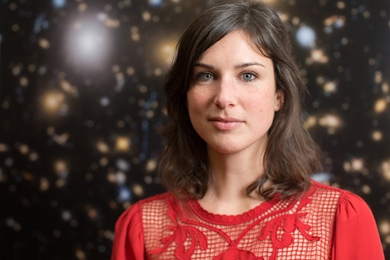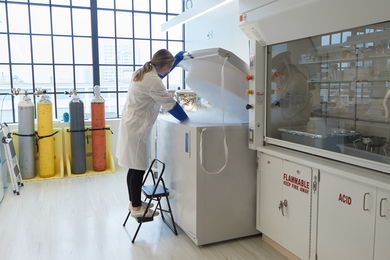Professor Gian-Carlo Rota of the Department of Mathematics, internationally recognized as a pioneer in discrete mathematics, has been selected as the recipient of the 1996-97 James R. Killian Jr. Faculty Achievement Award.
The announcement was made at the May 15 faculty meeting by the chair of the Killian Award Committee, Professor George Stephanopoulos, the Arthur D. Little Professor of Chemical Engineering.
The annual award, established in 1971 as a tribute to the late Dr. Killian, MIT's 10th president and former chairman of the Corporation, recognizes extraordinary professional accomplishments and service. The recipient traditionally delivers a lecture in the spring term of the award year.
Reading from the citation prepared by the committee, Professor Stephanopoulos described Professor Rota as a "leading innovator and theorist in the transformation of combinatorics from a disparate collection of facts and techniques unworthy of serious mathematical consideration into an active, systematic and profound branch of modern pure and applied mathematics."
Other members of the selection committee were Professors Alice Amsden of the Department of Urban Studies and Planning, the Ellen Swallow Richards Professor of Political Economy; Kenneth Keniston of the Program in Science, Technology and Society; Jeremy C. Stein of the Sloan School, the J.C. Penny Professor of Management; and Robert Weinberg of the Department of Biology and the Whitehead Institute.
A 1964 paper by Professor Rota, "On the Foundations of Combinatorial Theory," was of "epochal significance," the citation continued. Professor Rota received the American Mathematical Society's Steele Prize in 1988, an award which cited his publication as "the single paper most responsible" for the revolution that incorporated combinatorics into the mainstream of modern mathematics.
"This work," the citation continued, "has attracted many followers and has led to the new field of algebraic combinatorics in which many of the most outstanding contributors are Rota's students, or students of students, or collaborators and colleagues at MIT. Rota's work and influence have led to MIT's becoming the acknowledged primary academic center, the Mecca, of discrete mathematics, with a steady stream of visitors, students and junior faculty who go on to form groups at other leading institutions."
The citation also noted Professor Rota's "profound contributions to invariant theory and universal algebra," work which has "helped to recast and to reinvigorate" this traditional area of 19th-century mathematics.
"As if the invention and reinvention of major areas of mathematics were not enough," the citation went on, "Rota is without peer in his commitment to mathematical scholarship, history and exposition. As close to a modern renaissance man as one can be, Rota's contributions to scholarship defy adequate summary." He is, the citation noted, founder and chief editor or associate editor of several journals, author of more than 150 scientific papers and more than 500 book reviews.
"Rota's services to the academic community, in MIT and beyond, have included, for example: presidency of the Massachusetts chapter of Phi Beta Kappa; chair of the mathematics section of AAAS; chair of the MIT Freshman Advisory Council (where, in a conscious act of community service, and as a successor to Paul Gray, he served as MIT's de facto Dean of Freshman); and a continuing enthusiasm for teaching undergraduate subjects in mathematics. Rota has also served for many years as a consultant to the Los Alamos Scientific Laboratory. In 1971, he was made a Senior Fellow of the Laboratory."
He is a member of the National Academy of Sciences, a fellow of the American Academy of Arts and Sciences, a corresponding member of the Academia Argentina de Ciencias, a fellow of the Institute of Mathematical Statistics, the Heidegger Circle, the American Association for the Advancement of Science and the Husserl Circle.
In conclusion, the citation said: "Characterized by his peers as `one of this century's great scholars and teachers,' Rota is a member of that rare breed of scientists who may be referred to as `universalists.' His broad interests, knowledge and versatility are of `Renaissance' proportions. A colleague of Rota has written: `The characteristic qualities of Rota's mathematical work are freshness, simplicity and courage. He has a strong sense of history and is willing to look at any idea, problem or area on its own terms, without regard to current fashion or popularity, and to bring to it his own contemporary sensibility, imagination and judgment, together with his extraordinary energies.' In his more than 30 years of contributions as a researcher and teacher he has left a profound imprint in several areas of mathematics and on several generations of mathematicians. "
Professor Rota was born in 1932 in a small village near Milan, Italy. In the final years of World War II fear of arrest forced his family to become itinerant political refugees within Italy. Eventually, they moved to Ecuador, where Professor Rota completed his secondary education. He holds the BS degree summa cum laude in mathematics from Princeton University (1953) and the PhD from Yale (1956). He joined MIT in 1962 and has remained here since except for two years, 1965-67, when he was on the faculty of Rockefeller University.
A version of this article appeared in MIT Tech Talk on May 22, 1996.





